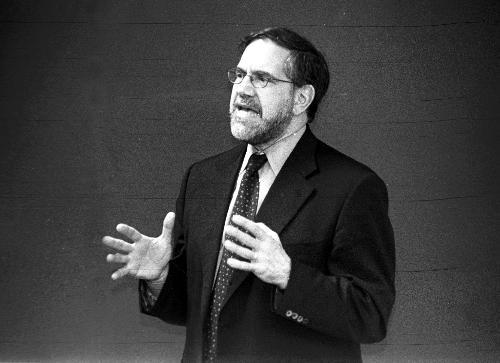
News
Summers Will Not Finish Semester of Teaching as Harvard Investigates Epstein Ties

News
Harvard College Students Report Favoring Divestment from Israel in HUA Survey

News
‘He Should Resign’: Harvard Undergrads Take Hard Line Against Summers Over Epstein Scandal

News
Harvard To Launch New Investigation Into Epstein’s Ties to Summers, Other University Affiliates

News
Harvard Students To Vote on Divestment From Israel in Inaugural HUA Election Survey
Provost Speaks Out Against Stigma of Mental Illness

Provost Steven E. Hyman jump-started the first annual Mental Health Awareness and Advocacy Week at Harvard with a lecture last night in Emerson Hall that addressed the stigma of mental illness in American society.
Hyman, the former director of the National Institute of Mental Health, spoke to about 35 people on behalf of the Mental Health Awareness and Advocacy Group (MHAAG)—a campus organization founded in 1997 that aims to make members of the Harvard community recognize the seriousness of mental illness.
The provost said that depression and eating disorders are broadly recognized at Harvard, but mental illness still remains plagued by stigma.
“Mental illness is nobody’s fault,” he said.
Hyman said treatment is often not sought by patients who are too ashamed to seek help for mental health problems such as depression and eating disorders.
Hyman said educational programs monitored by advocacy groups, which provide scientific evidence for the public, are an effective way to raise awareness of mental health and illness.
“Using scientific evidence is not intended to diminish an individual’s condition but to try to convince people an illness is no way qualitatively different from high blood pressure,” Hyman said.
It is harder to conduct research on mentally ill patients than on the physically sick, making stigma more deeply rooted in common belief, Hyman said.
“Our society remains at a very early stage of understanding the human brain, which makes objective tests for mental illness a major difficulty for identifying the illness,” he said.
Hyman also emphasized the difference between society’s perceptions of mental illness compared to the way people regard physical aliments.
Both Parkinson’s disease and schizophrenia are treated with dopamine, but the public tends to stereotype those with schizophrenia and feel pity for those with Parkinson’s disease, Hyman said.
Hyman’s talk also addressed the problem of inequity in the treatment of mental illness, especially among the poor.
“[People say that] everyone is on Prozac or Ritalin,” Hyman said. “But this does not match with some people’s situation.”
He denied that America was a “Prozac Nation” and said many people remain unable to afford adequate mental health care.
But Hyman was optimistic about future scientific and medical developments in psychotherapy.
“We should not mistake difficulty with possibility,” he said.
Throughout the week, MHAAG will hold panel discussions and display students’ narratives about mental illness in the Science Center.
Want to keep up with breaking news? Subscribe to our email newsletter.
